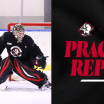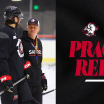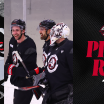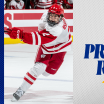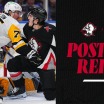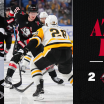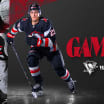It's 3:30 on a late August afternoon, and Ralph Krueger has just finished meeting with his coaching staff as he settles into a seat inside the team lounge at KeyBank Center.
Krueger has assigned tasks to each of his assistants for the summer - proposals on breakout options, feedback on special teams - and now, they're in the process of confirming and solidifying the principles that will come to define Buffalo Sabres hockey.
Tonight, Krueger will meet over dinner with the team's high-performance staff to further discuss off-ice habits - nutrition, physiotherapy, mental training - that have become increasingly vital to success in the NHL. The next two days will be spent establishing organizational continuity through conversations with the coaching staffs in Rochester and Cincinnati.
Aggressive and Connected: What to expect from Sabres hockey under Krueger
New system stems from collaborative effort between head coach, assistants
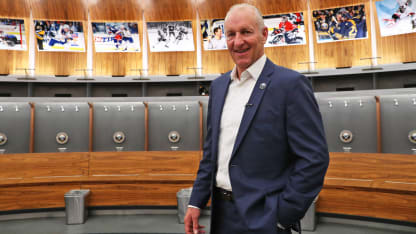
"I've been here since the middle of May," Krueger says. "All those steps so far have gone smoothly, and I feel comfortable with the way we're evolving. We're getting the game plan together that's fitting to the Sabres today. That's what I feel has happened here."
All of this is in preparation for Thursday, Sept. 12, when players report to KeyBank Center for the official start of training camp. Sabres.com spoke with Krueger and members of his coaching staff for insight into the characteristics that will characterize his brand of hockey.
Inclusivity
From a technical standpoint, the Sabres' system will be a blend of the core principles Krueger has formed through nearly three decades of coaching and the input he receives from players and staff.
Yes, Krueger was hired to bring a specific style of hockey to Buffalo, one he believes fits with the current state of the roster and falls in line with general manager Jason Botterill's vision. But he prides himself on being flexible to the viewpoints of those he surrounds himself with.
Krueger's staff consists of a trio of assistants in Don Granato, Steve Smith, and Mike Bales, along with a pair of video coaches in Myles Fee and Kyle Smith. If one of them raises an idea for, say, a new way to enter the offensive zone, it goes to the table for open consideration.
"There could be a specific input from an assistant coach or an angle that I've never heard before or seen before that I will open my mind up to, and maybe it will alter my course," Krueger said. "That's going to happen in discussion with players, that's going to happen once we experience games.
"… We're evolving a brand-new way to package this. Now, within this package there's going to be a lot of root principles that I believe in as a head coach need to be in place. But there will be others that are new, refreshing. I think that's important. You're asking about philosophy. My philosophy is to have clear guidelines but also be flexible about the way you bring them into life."
Steve Smith, a member of Buffalo's coaching staff last season, worked with Krueger for three seasons in Edmonton and has followed his career ever since. He said the collaborative environment that's been fostered throughout the summer in Buffalo has been on par with his experience while Krueger was at the helm for the Oilers in 2012-13.
"Any time we talk about any of the areas - forecheck, neutral-zone forecheck, talking about defensive-zone systems - he wants everybody's input," Smith said. "He's laying out the skeleton of a system that he wants in place, but he wants everybody's input so that it's really clear that nothing has been missed amongst the group.
"He ensures that we feel we have a lot of value to what he's doing. He takes the lead on it, but each and every guy gets their opinion heard and he makes the final decision on what he wants."
That mentality extends to players as well. Krueger made it a point to do more listening than talking during introductory meetings with members of the Sabres and took their inputs into consideration as he crafted a game plan.
"The feedback is essential," Granato said. "Empowering people is essential. That's what Ralph has really stressed upon us, is we're all part of a team here. We need to have support, and everybody needs to engage in this to feel good about what they're doing in any role.
"But yeah, everything we do is on the premise of, we want to make sure the players have clarity and it's a simple and direct message so they can play their best and have fun doing it and obviously have success. Tying all that together is the objective."
Aggressiveness and Connectivity
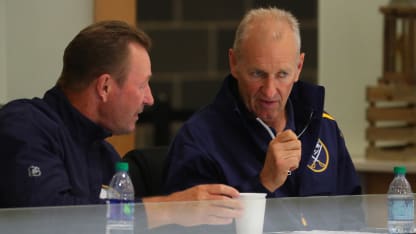
© Bill Wippert
So, how will the Sabres aim to play under Krueger? With pace and aggressiveness, for starters.
"I think there's going to be a lot of pressure, there's going to be a lot of skating," Smith said. "We're going to have to be a very fit team to play this system. All three zones, we're going to be aggressive, we're going to put a lot of pressure on teams.
"I think our guys are going to enjoy it. I think they're going to have to be on their toes if we're going to have success."
Though the Sabres had little time for learning in advance of the Prospects Challenge this past weekend, you could see the core tenets of tempo and puck pressure at work.
That was particularly true for the team's defensemen, whether they were closing gaps in the neutral zone or being quick to pinch down along the wall on the forecheck.
"That's one big thing that they've kind of pressed this weekend," defenseman Casey Fitzgerald said Monday. "Stepping up and holding that line and having good gaps and being able to shut plays down and not letting them get past the red line there and playing that aggressive game."
That sort of thinking aligns itself with the way Krueger described his philosophy during an appearance on The Instigators in July.
"It's creating pressure at the puck," he said. "And then as you move away from the puck and your role drops from second, third, fourth, fifth player, you will have more of a zone than a man focus. But at the puck, the aggressiveness is going to be important and what that does is stops those long, cycling shifts.
"When we moved the blue lines, it changed the game. You need to, first of all, be much, much more aggressive at the blue line than you used to be so that entries become difficult. You don't want to give simple, soft entries at any point in time. So, it begins all the way up in the offensive zone. … I think that being aggressive before we even get into the D-zone will be the beginning of everything."
"Aggressive" is one term you'll hear used to describe Krueger's vision for Sabres hockey. The other is "connected." Krueger's goal is for those who watch the team to feel a unity between the five players on the ice at a given time. Getting there will require a balance between off-ice buy-in and on-ice repetition.
Within that framework, players will be empowered with the freedom to express themselves and their individual strengths.
"Peak performance," Granato said. "Guys playing to their identity, playing within a role that is going to contribute to our success as a team, as a group. He wants to do what we can do as a team, even within our system, to help guys get to their peak performance.
"A real easy clarity on what we are as a team, what you are as an individual, what we can all bring to that."
Smith, already familiar with the Sabres roster, believes the team's offensive-minded players will embrace this high-octane style.
"The system that we're starting to implement will be something that I think they'll enjoy because, really, I think it's about puck possession," he said. "It's all about getting pucks back. It's about playing strong defense through strong offense and continuing to pressure teams when we don't have the puck.
"I think the day that you tell a player that he's going to have to slow down or hang back, I think they don't like that. They want to skate, they want to keep their feet moving, they want to be part of something that's aggressive because that's the nature of the game."
Communication and Buy-in
Establishing a system is one thing. Teaching it and getting players to buy in is another.
A major point of emphasis for Krueger and his staff over the past few weeks has been to establish a clear, uniform language that will be conducive for teaching once the players arrive for the start of camp.
"There is a system. There is a structure to it. That's really the easy part," Granato said. "Any coach can spew out systems and structure. That's all there. Getting guys to relate to it, to identify it with success individually and collectively, often comes down to a matter of interpretation and clarity.
"The work has really been to simplify that so the players can play. That's the goal, is we want the players to play."
That simplicity - allowing players the freedom and ability to play instinctually - is one element that should excite players during camp.
"When I've talked to Ralph, I've mentioned to him that I want to get back to just using my instincts more as opposed to thinking," alternate captain Kyle Okposo said. "For a hockey player, I think that's really important.
"If you talk to anybody, they're going to tell you they're at their best when they're not thinking out there. People use that term a lot. They're using their instincts. I think that's kind of the game he wants to play. It's two guys here, three guys there, and then … Go. Play. I'm really looking forward to it."
KRUEGER
The other element that should promote buy-in is a belief that the coaches truly want what's best for players. Okposo and Sam Reinhart both sported big smiles as they described their interactions with Krueger, conversations that when beyond the realm of hockey.
"He's able to just have a conversation and really take an interest in what you have to say. He wants to know about your family, he wants to know about your life, what's going on," Okposo said. "… I think that trust is going to be very important for guys."
As he mapped out the process in August, Krueger stressed the fact that building trust and familiarity will take time. The team's six preseason games, along with three weeks of practice, will be invaluable in that sense.
"As we experience things, the relationships will deepen and the trust will grow, which is the most important thing you can have between coaches and players," Krueger said. "You want to develop trust. We have an outstanding group of personalities in there in terms of character.
"Everyone who was hired is brining character with them, and I believe our dressing room and locker room is filled with character. So, I trust it's going to happen, but you need to invest time."


